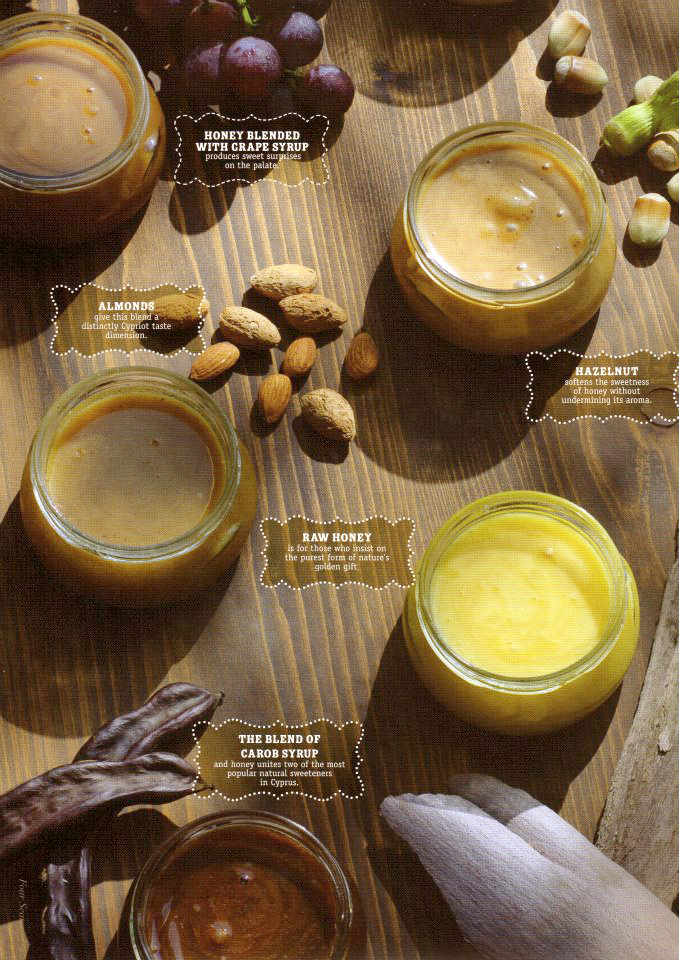Since moving to Woodinville from Greece two years ago, Tasos Manouras has found himself with some time on his hands. While his wife spends her days in the Redmond offices of Microsoft, Manouras takes care of their two children, a 4-month-old and a 4-year-old. He’s also the family cook, always on the lookout for healthy things to feed them. That’s how he got the idea to create a raw honey and hazelnut spread—what he calls “Nutella, only healthier.” Manouras’ concoction doesn’t, however, include chocolate, though he does sometimes add a little cocoa powder to it for his 4-year-old. The product is delicious, the nuts giving the honey more depth. I’ll spread it on bread with soft cheese, though sometimes I’ll just lick it from the jar.
“We started with the raw honey (which my son eats by the tablespoon),” Manouras says. “I didn’t want to add anything unhealthy. I eat a lot of unsalted raw nuts on a daily basis, so I thought let’s try that and see what happens,” marketing it under the brand name Ariadne Pure. What happened was that local restaurants and food retailers fell in love with it, including Tom Douglas, DiLaurentis, Cone & Steiner, and Elysian Bar. Uwajimaya has just started buying from him as well. Part of the product’s appeal is that all his honeys include 20 percent of whatever they’re blended with—such as the hazelnuts—which gives them more complexity of flavor.
Ariadne Pure’s growing client list also clamors for his homemade grape syrup (similar to an Italian saba). “I have the best one in the states by far,” Manouras says. “It’s concentrated grape, with no additives or preservatives.” The main differentiator is the type of grape—the Nemea grape, a variety he gets from Greece. At Lola, the syrup is used on a dish with halloumi cheese; Westward uses it in its Mediterranean fare as well. Traditionally the grape syrup is eaten with Greek yogurt or in Greek pancakes, but Manouras suggests mixing it with peanut butter for a twist on a PB&J, in a kir royale, or drizzled over grilled peaches with ricotta cheese—a summery dish I’m planning to try ASAP.
Manouras is modest about Ariadne Pure’s success, though. His family, he says, has been in the olive-oil business for several generations back in Greece, so the manufacturing part of the process was simple. The challenge lay in bringing it to a new market—not just winning over customers, but dealing with all the FDA labeling regulations, particularly for his organic products, like the organic oak-tree honey. “Sometimes a shipment comes in and the FDA might decide they want to hold it.” He’s currently working to get certification to make his grape syrup organic as well.
Once the products make it here, Manouras stores them in a warehouse in Issaquah and then hand-delivers them to his clients. “I’m not working with any distribution company, so anyone who works with me knows it’s from me,” he says. “When I go to a buyer or chef, I just say [about the product] ‘what you see is what you get.’ When they taste it, they place an order.”
Next up for Manouras is sea-salt flakes, for which he’s been told there’s a big market, and a carob syrup. Given his current success, it’s safe to assume these will be hits as well. But will he be able to keep up with the expansion? “My mother-in-law came to help out in the beginning. Now I think I’m going to need a babysitter.”
Citizen Food features willful adventurers in food culture–who typically have (or had) a day job outside a kitchen. Know anyone who fits that bill? If so, send info to nsprinkle@seattleweekly.com.
nsprinkle@seattleweekly.com




